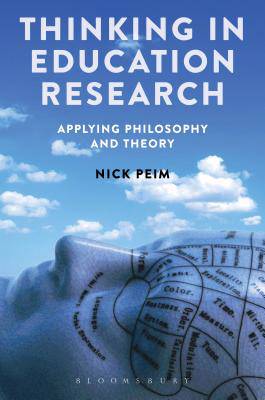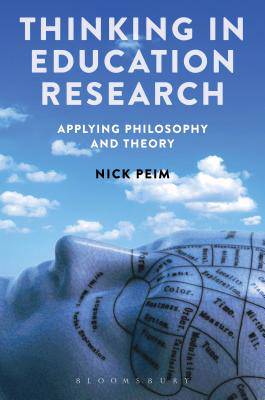
- Retrait gratuit dans votre magasin Club
- 7.000.000 titres dans notre catalogue
- Payer en toute sécurité
- Toujours un magasin près de chez vous
- Retrait gratuit dans votre magasin Club
- 7.000.0000 titres dans notre catalogue
- Payer en toute sécurité
- Toujours un magasin près de chez vous
64,45 €
+ 128 points
Format
Description
Thinking in Education Research examines the resources available from philosophy and theory that can be practically applied to any educational research project. Nick Peim argues that the current well-established divide between theory and the empirical in research methods is unhelpful to students. Instead, Thinking in Education Research looks at major lines of thinking in modern European philosophy, from Kant to Freud and Derrida to Malabou, and how they provide a rich resource for every stage of conducting research. By getting students engaged in 'how to think' and 'how to do', Peim illustrates that thinking is in fact a vital part of how you do research and is not an aside.
Essential aspects of the research endeavour are re-examined in the light of key philosophical positions to offer constructive potential, including:
- defining the object;
- giving an account of the field;
- the relation to truth;
- the process of writing and constructing a case; and
- the value attributed to formal knowledge.
Thinking in Education Researchdoes not try to resolve the unresolved issues of research thinking but rather encourages readers to productively engage with them so that we can enhance the possibilities of research practice and find opportunities for its expansion and refinement.
Throughout the chapters, clear and concise summaries of key philosophical positions and ideas are complemented with boxed accounts of how the philosophical debates discussed can be applied to real research projects. These features encourage the reader to consider how they can develop thinking and apply theory at every stage of their own research. This is essential reading for any educational research methods student or practicing researcher for important ways of thinking afresh about research methodology.
Essential aspects of the research endeavour are re-examined in the light of key philosophical positions to offer constructive potential, including:
- defining the object;
- giving an account of the field;
- the relation to truth;
- the process of writing and constructing a case; and
- the value attributed to formal knowledge.
Thinking in Education Researchdoes not try to resolve the unresolved issues of research thinking but rather encourages readers to productively engage with them so that we can enhance the possibilities of research practice and find opportunities for its expansion and refinement.
Throughout the chapters, clear and concise summaries of key philosophical positions and ideas are complemented with boxed accounts of how the philosophical debates discussed can be applied to real research projects. These features encourage the reader to consider how they can develop thinking and apply theory at every stage of their own research. This is essential reading for any educational research methods student or practicing researcher for important ways of thinking afresh about research methodology.
Spécifications
Parties prenantes
- Auteur(s) :
- Editeur:
Contenu
- Nombre de pages :
- 296
- Langue:
- Anglais
Caractéristiques
- EAN:
- 9781472591074
- Date de parution :
- 08-03-18
- Format:
- Livre broché
- Format numérique:
- Trade paperback (VS)
- Dimensions :
- 155 mm x 231 mm
- Poids :
- 453 g

Les avis
Nous publions uniquement les avis qui respectent les conditions requises. Consultez nos conditions pour les avis.






